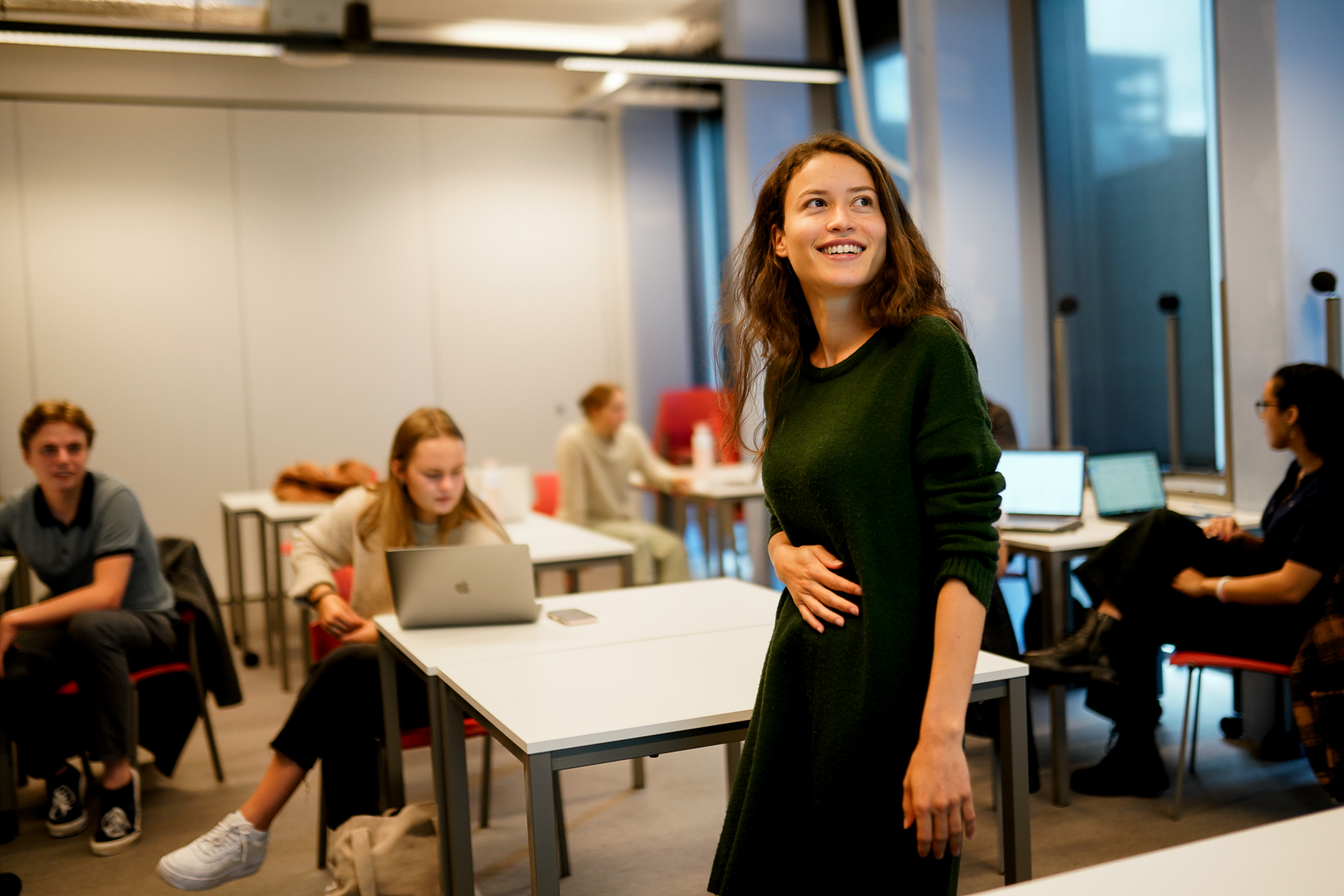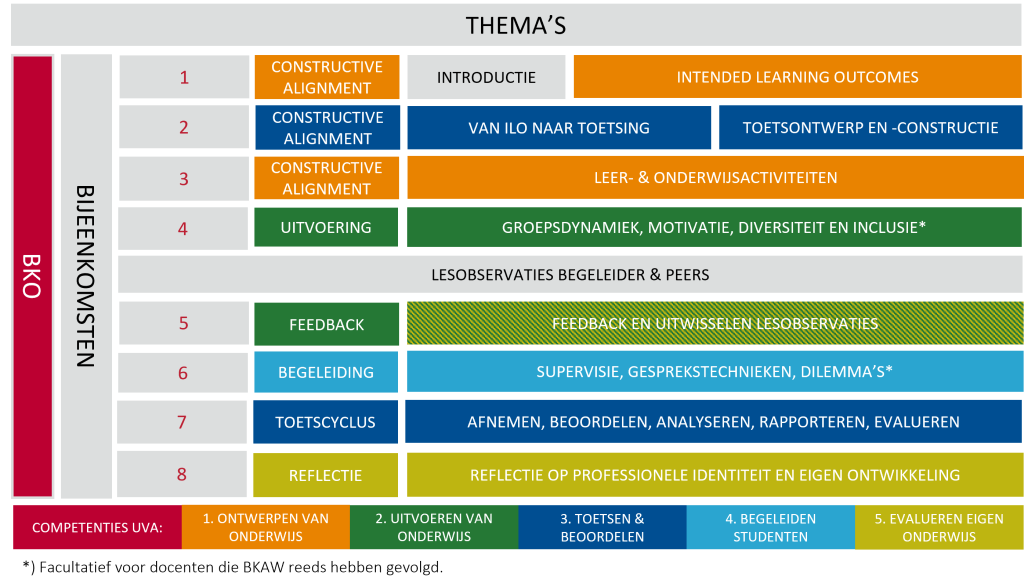
University Teaching Qualification (UTQ)
Are you a teacher with some teaching experience and want to further professionalise yourself? Then the UTQ programme offers you the opportunity to further professionalise yourself.
The University Teaching Qualification (UTQ) is not a qualification for starting teachers in their first year of teaching. That is what TLC-FdR’s BKAW was created for. This is because the UTQ assumes that you have already mastered certain basic skills and can build on them. The UTQ is an officially recognised national certification path whereby the path offers every teacher the opportunity to shape their teaching using the most recent educational theories. This is done in the area of 5 competences
- Designing education
- Implementing education
- Testing and assessing
- Supervising students
- Evaluating your own education
At the end of the programme, you compile a portfolio to demonstrate that you meet the criteria for UTQ certification. The UTQ committee will assess your portfolio. Candidates who complete the programme with a pass mark will receive an UTQ certificate.
All teachers with a permanent position should obtain their UTQ at least in the second year of their appointment. Teachers-4 should also be enabled to obtain the UTQ.
80 hours (24 hours contact time, 28 hours preparation time, 20 hours portfolio compilation, 8 hours lesson observations/intake interview/portfolio assessment.
You can start the UTQ programme twice per academic year (each semester has a start date and once a year the programme is in English.The duration of the programme is about 10 months.Intake interviews usually take place in September or January. The sessions of the UTQ programme start in October or February.
The UTQ Meetings:
We kick off the meeting with the principles of the FdR educational vision as a foundation for didactic choices and the role of teachers. You will also be introduced to constructive alignment, which is the starting point for good teaching. You learn about the usefulness of intended learning outcomes and in that light we discuss Bloom’s taxonomy. Next, you will work on formulating learning outcomes for your own course or review existing ones.
After the meeting, you will be able to:
- align the design of a course (component) with the vision of the FdR, the curriculum as a whole and related course components;
- formulate clear learning outcomes for a course, taking into account the level and learning outcomes of the programme. In doing so, you consider intended learning outcomes, work formats and testing in connection with each other (constructive alignment).
The next step is the design of testing appropriate to the learning outcomes and in line with the FdR testing framework. During this meeting, we will consider steps 1 and 2 of the assessment cycle: assessment design (which assessment form is appropriate to measure mastery of the learning outcomes?) and assessment construction. In this step, attention is paid to the design of an assessment matrix and the assessment instrument, such as a rubric, and the quality requirements for testing. You will work on drafting an assessment matrix for your own course or review an existing one.
After the meeting, you will be able to:
- choose test forms that fit the intended learning outcomes of the education and the learning outcomes of the programme and that also fit the FdR assessment policy and relevant regulations;
- design assessments and assessment instruments (or parts thereof) that are in line with the desired learning outcomes and meet the applicable quality criteria.
This meeting focuses on designing challenging teaching activities according to the principles of the FdR educational vision. What are factors that promote active and deep learning? You will work on the (re)design of your own lesson (sensor series) attuned to learning outcomes and assessment. In that (re)design, you will incorporate the knowledge and insights you gain during the meeting on:
- experiential learning
- metacognition and learning strategies
- blended learning
- community-based learning
- activating work forms.
After the meeting, you will be able to:
- (re)design a (blended) course, aimed at creating an active learning process for students, with varied, effective and activating work forms, teaching materials, course materials, ICT and multimedia;
- take into account contextual factors such as students’ prior knowledge, background and motivation in the educational design.
This session focuses on the implementation of teaching groups. Topics covered include formative practice (techniques to make student learning visible), motivational teaching, differentiation, group dynamics, and creating an inclusive learning environment. You will be asked to provide in advance an issue from your own teaching practice. Based on this meeting, you will formulate a (number of) intention(s) and/or action(s) for future lectures that can also be the subject of the lesson observation that follows this meeting.
After the meeting, you will be able to:
- guide and optimise interaction within group processes;
- regularly evaluate during lessons whether students develop the desired knowledge, skills and attitudes;
- respond to (zero) situations and interests of students, taking diversity into account, in order to create an inclusive and socially safe learning climate;
- promote students’ critical and inquisitive attitudes and problem-solving skills.
This meeting focuses on the feedback process; the power of feed up – feedback – feed forward. Which feedback triggers learning? During the exchange of lesson observations, you practice applying feedback rules.
After the meeting, you will be able to:
- formulate constructive feedback on the content and process of students’ work that encourages learning;
- reflect on your actions as a teacher based on the lesson observations. Specific attention will be paid to elements of activating teaching and experiential learning and blended learning (if possible);
- improve your teaching on the basis of feedback, evaluation data and your teaching experience.
This session focuses on the teacher’s role as a supervisor of students. Various guidance and conversation techniques are discussed that promote student self-regulation. In addition, we will discuss dilemmas that, for example, touch on the area of tension between the role of supervisor and assessor.
After the meeting, you will be able to:
- use different supervision styles, depending on the needs of the student(s);
- provide students with constructive feedback (in writing) on the content and process underlying their work that encourages learning;
- strike the right balance between guidance and assessment;
- refer students appropriately in case of problems or stagnation.
This meeting focuses on the competence ‘testing and assessment’. We cover important topics from steps 3 to 7 of the asssessment cycle: administering, reviewing and assessing, analysing, reporting and evaluating.
After the meeting, you will be able to:
- check and assess efficiently, effectively and reliably;
- analyse test results;
- assess the quality of the test and adjust it where necessary.
The last meeting is devoted to reflecting on your own development during the past period and for the future, after having obtained your UTQ. You present what the UTQ programme has brought you and what kind of teacher you want to be; what do you (still) need to develop further and who or what do you need for this? In addition, the session is dedicated to the portfolio. You can ask your final questions to come to a successful conclusion.
After the meeting, you will be able to:
- reflect on your actions as a teacher in teaching and your role in the teaching team;
- reflect on your growth and development as a teacher based on feedback, evaluations and results.






